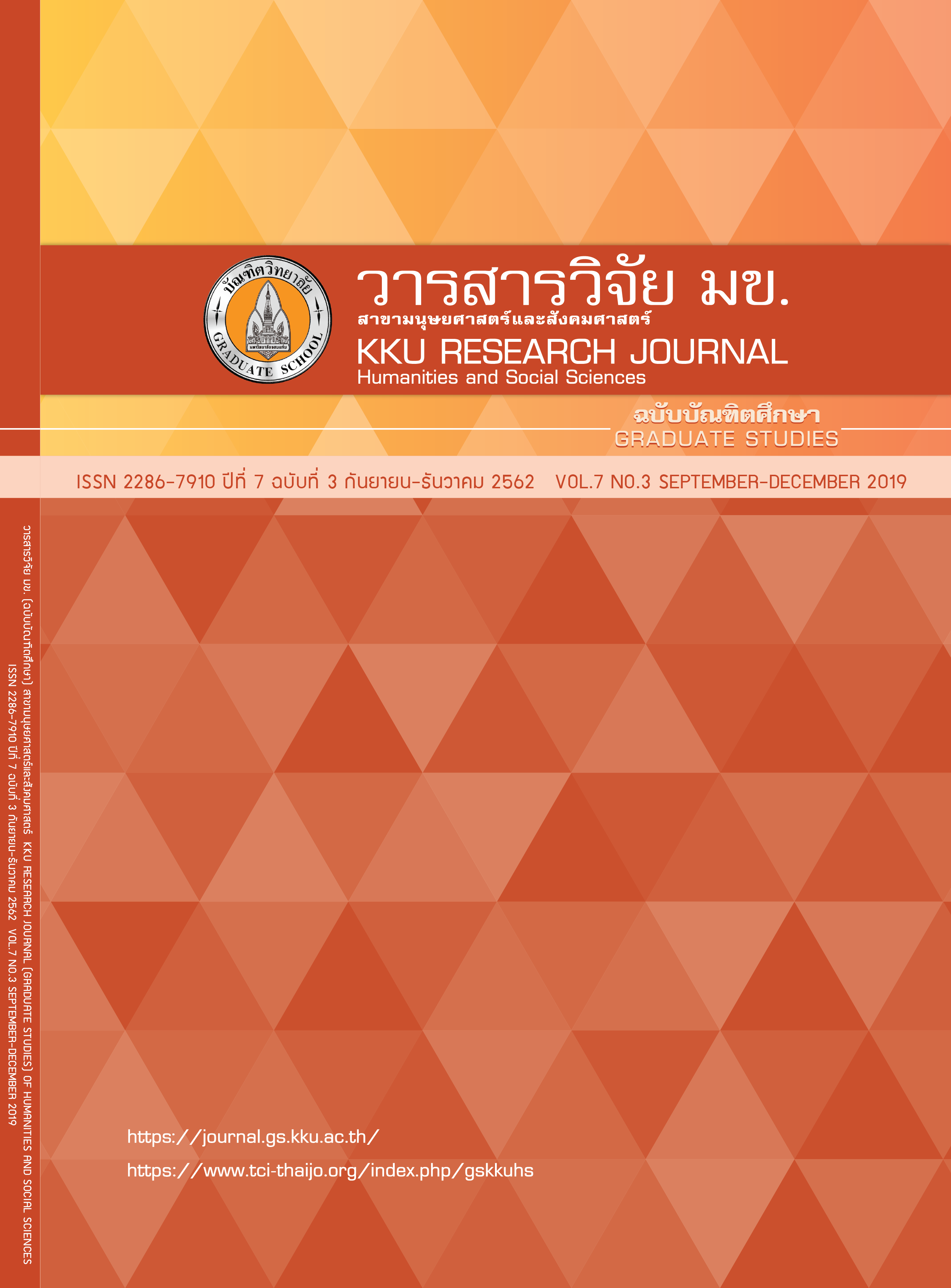The Development of Learning Packages on Electrochemistry by Using Project Base Learning for Mathayomsuksa 6 Students at Princess Chulabhorn Science High School Loei
Keywords:
Learning packages, Project base learning, Efficiency of learning packagesAbstract
The purposes of this study were 1) to develop of the learning packages on electrochemistry by using Project base learning (PBL), and to find the efficiency of the package according to the standard criterion of 80/80. 2) to study the effectiveness index of the learning packages on electrochemistry by using PBL. 3) to compare the students’ learning achievement before and after learning through the learning packages on electrochemistry by using PBL. 4) to study the students’ satisfaction towards the learning packages on electrochemistry by using PBL. The samples were 48 Matthayomsuksa 6 students studying in the first semester of the academic year 2016 at Princess Chulabhorn Science High School Loei, they were selected by purposive sampling. The instruments used in this study were 1) sevent sets of the learning packages on electrochemistry by using PBL and sevent lesson plans on electrochemistry for Matthayomsuksa 6 students. 2) a 40-item with 4 multiple-choice achievement test with the reliability value at 0.83, and 3) the satisfaction questionnaire. The statistics used for analyzing the collected data were percentage, mean and standard deviation. The hypothesis was tested by using dependent samples t-test. The findings were as follows: 1.The learning packages on electrochemistry by using PBL had an efficiency of 85.78/82.45, which was higher than the criteria set at 80/80. 2. The developed learning packages on electrochemistry by using PBL had the valued effectiveness index of 0.75. 3. Matthayomsuksa 6 students who learned by learning packages on electrochemistry by using PBL, after learning had higher achievement than before learning at the .01 level of statistical significance. 4. Matthayomsuksa 6 students were satisfied toward the learning packages on electrochemistry by using PBL both as a whole and at each aspect at very high levels. The ranking from the highest to the lowest mean scores were content, roles of teachers, learning management and learning media, respectively.
References
Curriculum 2011. Princess Chulabhorn Science High School; 2014.
2. Porntip S. STEM Education 21st Century Skills Development. Executive
Journal. 2013; 38(2): 49-56.
3. Office of the Basic Education Commission. Ordinary National Educational Test
Report (O-NET) of Princess Chulabhorn Science High School academic year 2016.
Bangkok; 2015.
4. Khotjampa N. Development of using Laboratory Method Activity Packages of
Project-Base Learning to the Conceptual Thinking Ability, Problem-Solving
Thinking Ability and Science Achievement of Prathom Suksa 4 Student. Thesis
Master of Education Degree Research and Development in Education
Sakon nakhon Rajabhat University; 2014.
5. Phromkadkeaw T. Basic of Project Base Learning (PBL). IPST Magazine.
2014; 42(188): 14-17
6. Ministry of education. Guidelines for Project Base Learning (PBL).
Bangkok: Executive Journal; 2014.
7. Tharavej P. The Development of Learning Packages on Body Systems
in Science Learning Area By Using Coorperative Learning STAD
Technique For The 2nd Students. Thesis Master of Education Degree
Curriculum and Instruction Buriram Rajabhat University; 2012.
8. Im Sang Chan D. Development of learning outcomes on philosophy
of sufficiency economy for the national development on economy and
problem solving abilities through the process of project-based learning
of Mathayomsuksa 5 students. Thesis Master of Education Degree
Teaching Social Studies Graduate School Silpakorn University; 2011.
9. Duangjit K. The Comparison of Learning Achievement, Critical Thinking
Ability and Attitude toward the Subject of Science between the Inquiry-Based
Learning Method (7E) and the Project Work Learning Method for
Mathayomsuksa 6 Students. Thesis Master of Education Degree
Curriculum and Supervision Graduate School Mahasarakham University;
2014.
10. Charoenrat J. The Development of Analytical Thinking Ability and
Science Process Skills for Ninth Grade Students Taught by Project
Approach. Thesis Master of Education Degree Curriculum and
Supervision Graduate School Nakhonpathom Silpakorn University; 2012.
11. Senarpa R. The Effects of Project Based Learning on Learning of
Basic Skills in the 21st Century Based on Physics of Work and Energy
for Mathayomsuksa 5 students. Thesis Master of Education Degree
Educational Research and Evaluation Pibulsongkram Rajabhat University;
2015.
12. Art-in S. Project Based Learning in Curriculum Development Course
for Five-Year Bachelor’s Degree Students. Khon Kaen University Research
Journal. 2011; 1(1): 1-16.



